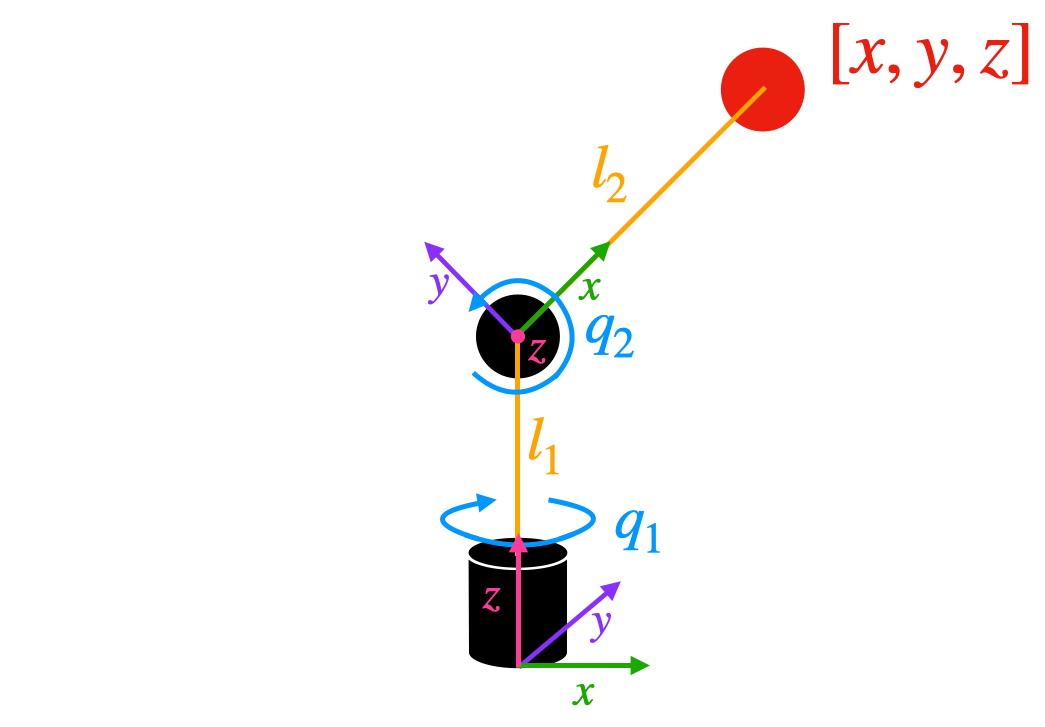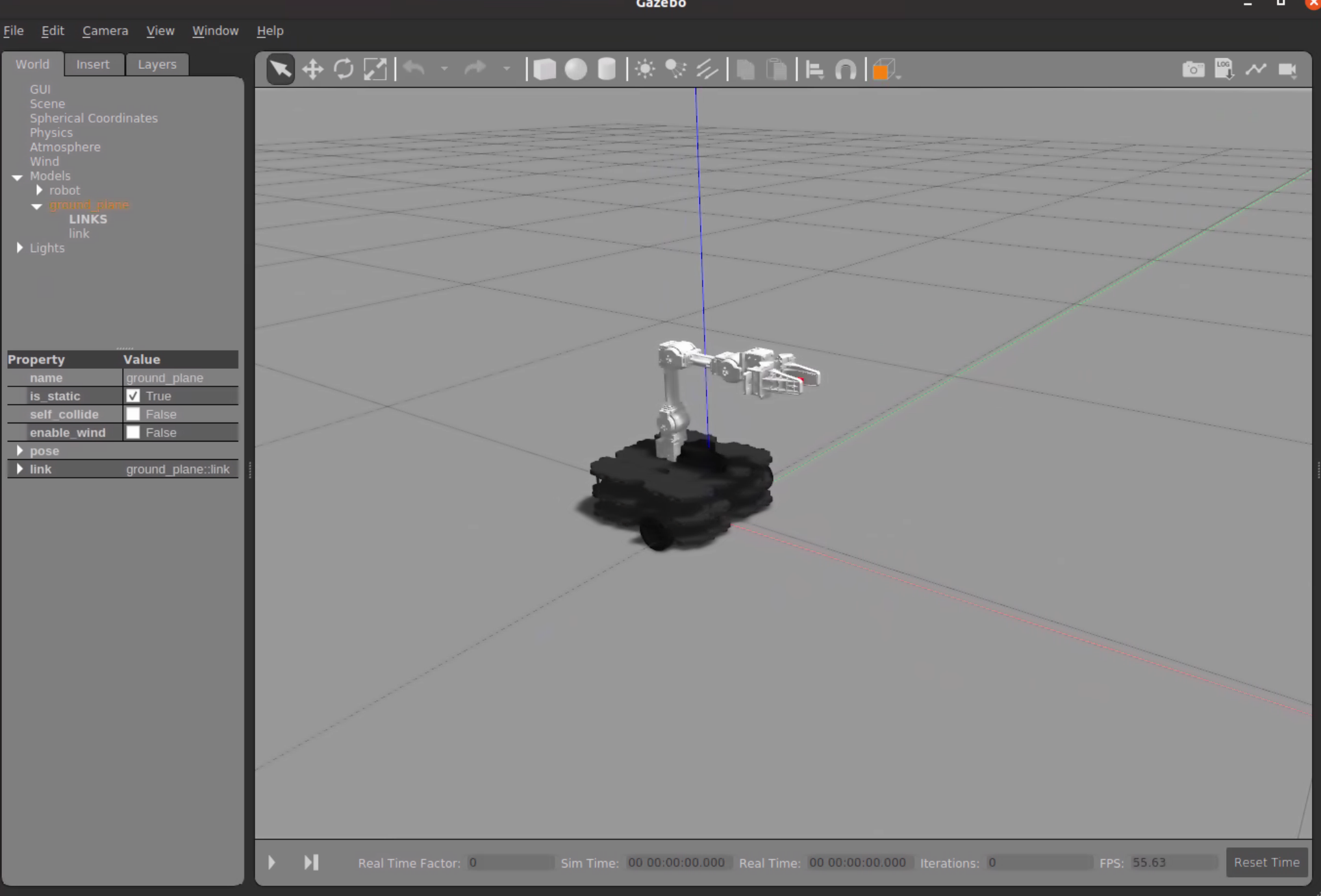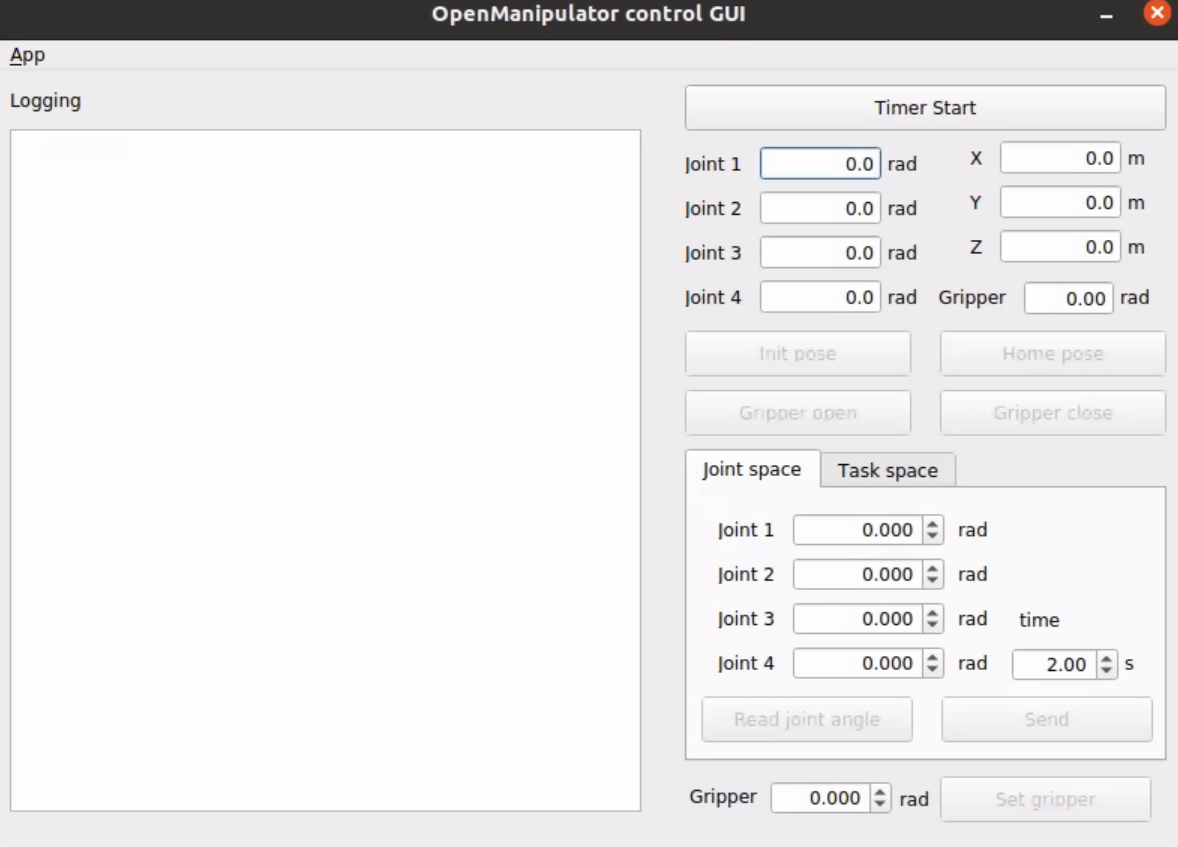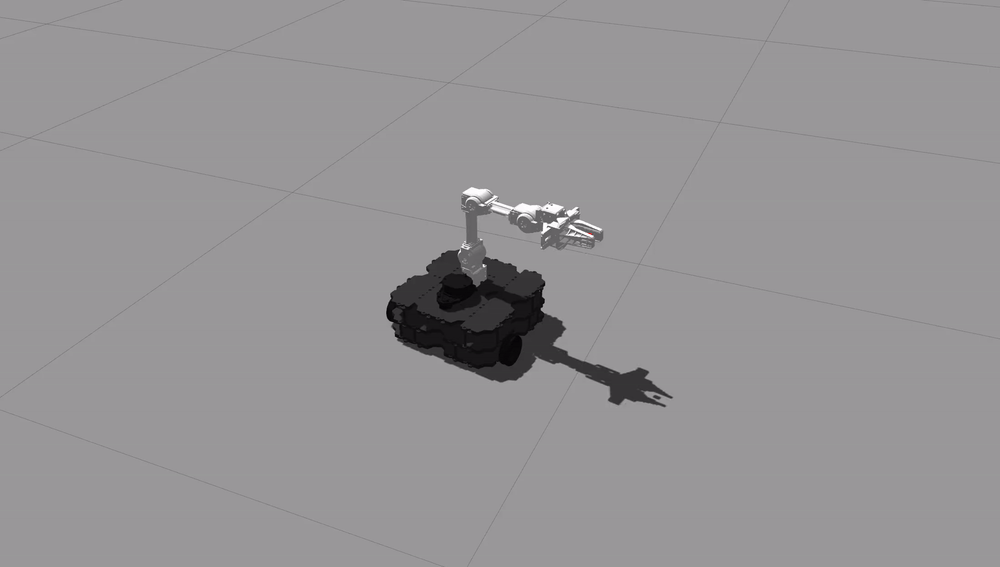Class Meeting 08: Forward & Inverse Kinematics
Today's Class Meeting
- Learning about forward and inverse kinematics (here's a link to the slides)
- Getting introduced to the moveit ROS package to control the Turtlebot3 OpenMANIPULATOR
- Implementing TrafficBot and Learning the basics of ROS msg files
What You'll Need for Today's Class
- Some scratch paper to work through some of today's class exercises
- The class Zoom room
- Your Ubuntu 20.04 programming environment
Class Exercise #1: Computing Forward Kinematics for 3DOF Robot Manipulator in 3 Dimensions
For this exercise, work independently to compute \([x, y, z]\) of the robot's end effector in terms of the lengths of the robot's two linkages \((l_1, l_2)\) and the angles of rotation of the two revolute joints \( (q_1, q_2) \). If it's useful to you, feel free to reference the slides we just went over in class.

Once you've finished computing \([x, y, z]\), please wait for others to finish. We'll go over the solution in the main Zoom room together.
Class Exercise #2: Basics of Robot Arm Control
Please head into breakout rooms for this class exercise.
In this class exercise, you will 1) learn the basics of turtlebot's arms though GUIs, 2) learn how to manipulate the arm through code.
Arm Control Through GUI
Let's go over the Turtlebot3 tools that allows you to control the robot arm with a GUI. First run the following command, which starts starts a gazebo session a Turtlebot3 with an OpenMANIPULATOR arm.
$ roscore
$ roslaunch turtlebot3_manipulation_gazebo turtlebot3_manipulation_gazebo.launch
Next, you need MoveIt to manipulate the arm. Launch the following in a new terminal. Once this node is up and running, start your gazebo simulator by pressing the ▶ button in the
bottom left. You should see a message that says, You can start planning now! in the terminal running the move_group.
$ roslaunch turtlebot3_manipulation_moveit_config move_group.launchFinally, you need some GUI to control the robot arm. The ROBOTIS GUI provides you with a simple window that allows control of the robot arm within gazebo. Use the following command to launch the GUI. Make sure your gazebo simulation is running and not stopped; otherwise the GUI window will not pop up.
$ roslaunch turtlebot3_manipulation_gui turtlebot3_manipulation_gui.launch
The GUI provides the following information,
- the current position of each of the joints,
- the XYZ position of the red square between the robot's gripper in the simulation,
- the position of the gripper.
Let's make sure your simulation robot can move its arm. Press Time Start and then click on Home Pose. You should see your robot arm move to a new position in the simulation. Pay close attention to how the new pose changes the joint and XYZ values.
Manual movement of the arm is possible through the options in the bottom right features of the GUI. There are two options available for this purpose,
Task Space Control: Sets the position of the red square between the robot's grippers to a certain XYZ.Joint Space Control: Sets the position of each single join.
The window with an s next to it is for selecting how fast you want the the transformation to occur. Once you are done with your manual selection, send your desired positions to the robot and watch the arm move.
Think about the following questions while you experiment with the GUI,
- How does each joint impact the arm's position?
- What seems to be the plausible range of motions for each joint?
- Can you anticipate how changing a joint's value will affect the XYZ value?
- What is the relationship between what we learned today in class (forward and inverse kinematics) and the two options available for controlling the robot's arm?
Arm Control Through Code with the MoveIt Package
The MoveIt ROS package provides a simple, yet powerful interface to control the OpenMANIPULATOR arm on our Turtlebot3. This section outlines the general interface. There is no need to implement anything in the section. Just make sure that you understand the basics of the interface.
First, we setup the interface for controlling the gripper and the arm in the object initialization.
#!/usr/bin/env python3
import rospy
# import the moveit_commander, which allows us to control the arms
import moveit_commander
class Robot(object):
def __init__(self):
# initialize this node
rospy.init_node('turtlebot3_dance')
# the interface to the group of joints making up the turtlebot3
# openmanipulator arm
self.move_group_arm = moveit_commander.MoveGroupCommander("arm")
# the interface to the group of joints making up the turtlebot3
# openmanipulator gripper
self.move_group_gripper = moveit_commander.MoveGroupCommander("gripper")With this starter code, moving the arm or the gripper using joint angles is fairly simple. Let's try moving the arm,
def run(self):
...
...
# We can use the following function to move the arm
# self.move_group_arm.go(arm_joint_goal, wait=True)
# arm_joint_goal is a list of 4 radian values, 1 for each joint
# wait=True ensures that the movement is synchronous
# Let's move the arm based on what we have learned
# First determine at what angle each joint should be.
# You can use the GUI to find appropriate values based on your need.
arm_joint_goal = [0.0,
math.radians(5.0),
math.radians(10.0),
math.radians(-20.0)]
# Move the arm
self.move_group_arm.go(arm_joint_goal, wait=True)
# The above should finish once the arm has fully moved.
# However, to prevent any residual movement,we call the following as well.
self.move_group_arm.stop() Moving the gripper is very similar.
# We can use the following function to move the gripper
# self.move_group_gripper.go(gripper_joint_goal, wait=True)
# gripper_joint_goal is a list of 2 values in meters, 1 for the left gripper and one for the right
# wait=True ensures that the movement is synchronous
# Let's move the gripper based on what we have learned
# First determine what how far the grippers should be from the base position.
# You can use the GUI to find appropriate values based on your need.
gripper_joint_goal = [0.009,0.0009]
# Move the gripper
self.move_group_gripper.go(gripper_joint_goal, wait=True)
# The above should finish once the arm has fully moved.
# However, to prevent any residual movement,we call the following as well.
self.move_group_gripper.stop()Class Exercise #3: TrafficBot
In this exercise, we will use the arm of the turtlebot to guide an imaginary traffic. You should not use the robot's wheels for this exercise. You will be working the same groups.

Getting Started
To get started on this exercise, update the intro_robo class package to get the class_meeting_08_kinematics ROS package and starter code that we'll be using for this activity.
$ cd ~/catkin_ws/src/intro_robo
$ git pull
$ git submodule update --init --recursive
$ cd ~/catkin_ws && catkin_make
$ source devel/setup.bash Your Goal
Your goal in this exercise will be to have the robot arm move in a distinct manner based on the direction it receives via the
traffic_status topic.
Here is an example scenario.

Running Your Code
First terminal: run roscore.
$ roscoreSecond terminal: run your Gazebo simulator with the intersection environment provided in today's class repo.
$ roslaunch class_meeting_08_kinematics turtlebot3_intersection.launch
Thrid terminal: Launch the MoveIt move_group..
$ roslaunch turtlebot3_manipulation_moveit_config move_group.launch Forth terminal: Run the python node that moves your robot arm.
$ rosrun class_meeting_08_kinematics move.pySteps to Take & Starter Code
There are few steps you would need to take to complete this exercise.
- traffic msg: if you look into
class_meeting_08_kinematics/msg/Traffic.msg, you will see that it is an empty msg file. Update the msg file such that you can encode at least 3 directions with that message. Here are some helpful resources: official wiki and our short intro to ros msgs. - traffic controller node: Update the
class_meeting_08_kinematics/scripts/traffic.pyfile such that it publishes a traffic message with a different direction every 10 seconds. After this step, relaunch your gazebo world and make sure that your traffic controller is publishing traffic messages appropriately via rostopic echo traffic_status. - turtlebot traffic controller node: Update the
class_meeting_08_kinematics/scripts/move.pyfile such that the turtlebot arm performs something different per msg received in thetraffic_statuscallback function. Once done, run themove.pyfile and make sure your robot arm moves as it receives different messages.
Example Solution Code
Here is the example solution code
Tips & Hints about the Arm & Gripper
- The arm joints have limited movements. Their limits in degrees are listed below.
- Joint 1: -162 to 162
- Joint 2: -103 to 90
- Joint 3: -53 to 79
- Joint 4: -100 to 117
- The gripper has limited movement as well; it can only move between -0.01 and 0.01 meters.
- Make sure your arm's end goal does not collide with any objects (or the robot itself).
- The position of the arm shifts the robot's center of mass and may cause your robot to tilt in some direction if the the arm is pushed too far.
- The
move_groupnode will need to get launched every time you wish to control the robot through code using the MoveIt interface.
Acknowledgments
I want to thank Woolfrey for their helpful Youtube videos on forward and inverse kinematics for helping to inform the content for today's class.